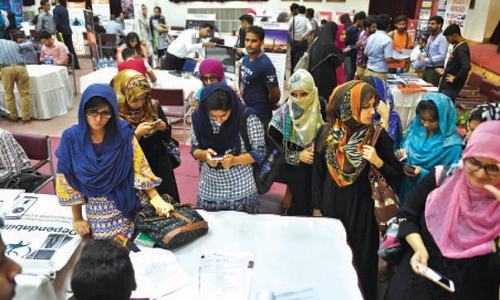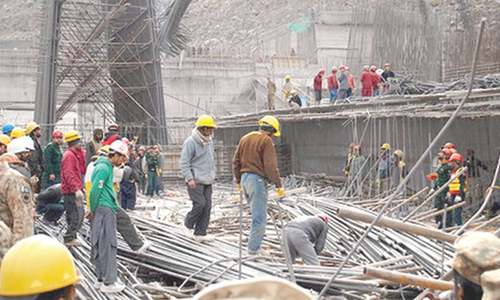ISLAMABAD: The government on Wednesday indicated about Rs100 billion (15 per cent) cut in the federal development programme this year and a major increase in emoluments of the federal bureaucracy and readjustments in fiscal transfers to the provinces in the coming budget to overcome fiscal challenges.
Based on a briefing by Finance Secretary Naveed Kamran Baloch, members of the National Assembly’s Standing Committee on Finance and Revenue also gathered that the government has to take a series of steps during the current month to “complete the second review” with the International Monetary Fund (IMF) for disbursement of $450 million next tranche in April.
As part of budget strategy for the next fiscal year, Mr Baloch highlighted some fault lines in the federal budget. These included increasing pension expenditure, debt-servicing costs, unsustainable ratio of federal transfers to the provinces and unrealistic allocations for subsidies and income support programmes.
Chairman of the NA committee Faiz Ullah of the PTI told media persons that the budget strategy would be finalised soon and presented to the federal cabinet for approval and would then be shared with a joint meeting of standing committees of the Senate and National Assembly on finance and revenue.
Provincial shares to be readjusted, salary of federal officers being increased in coming budget
He said the committee was told that the revenue target of Rs5.5 trillion had been reduced to Rs5.238tr and the government was in the process of negotiations with the IMF for a further cut. He said non-tax revenue had performed better as about Rs1.025tr had been recovered in eight months against the full-year target of Rs1.1tr.
He said the panel was informed that PSDP (Public Sector Development Programme) spending would be around Rs600bn against a budget target of Rs701bn. He said the finance secretary hinted at making another effort to raise funds from Pakistani diaspora and Sukuk bonds during the current fiscal year.
The committee demanded that the benefit of decline in oil prices be passed on to the general public.
Balochistan’s share out of federal transfers was based on assumptions of next year’s revenue collection target and needed to be looked into in the coming budget, the meeting was informed. This means the share of the country’s largest province by area was based on a budget target of Rs5.550tr for the current year while actually the collection may not go beyond Rs4.8tr.
The meeting was told that the government was fully adhering to three key principles of the IMF programme — no borrowing was made from the central bank, limit on sovereign guarantees was not breached and no supplementary grant was issued this year. Also, the matters relating to public debt and its repayment plans would have to be streamlined in the coming budget, partly through converting short-term payments into long-term loans.
The secretary finance emphasised that the provinces would have to consider revenue generation avenues starting next year budget and “come out of the dependency syndrome”. He said it was unreasonable on the part of the provincial governments to take money from the federal divisible pool and other federal transfers and increase their salary bills. The current 30:70 centre-provincial share ratio in the divisible pool “is unsustainable” as it left nothing in the hands of the federal government after accounting for defence and debt-servicing expenditures, he added.
Therefore, he said, the Centre would transfer some of the responsibilities to the provinces in the coming budget, besides correcting the imbalance caused by various grants and other transfers from the Centre to the provinces. He said there would be political challenges, but both the Centre and the provinces would have to increase their revenues. Also, he said, a large amount in the federal budget was being used for projects and responsibilities in the provinces and this would be corrected in the budget for 2020-21. Both the stakeholders would have to recognise that resources are scarce and should be utilised prudently.
The finance secretary also told the committee that the government would have to end the prevailing “disparity” in salaries and perks and privileges of the federal and provincial officers in grade-17 to 22 as the federal bureaucracy was clearly disadvantaged at present. Giving an example, he is reported to have told the committee that provincial chief secretaries were getting Rs400,000 per month higher executive allowance than heir grade-22 counterparts at the Centre.
The committee was informed that the BISP (Benazir Income Support Programme) allocation had been doubled from Rs80-90bn last year to about Rs195bn this year and this would also have to be examined if some cushion became available this year and going forward.
Responding to some questions about Rs2tr cash development loan on the National Highway Authority, Mr Baloch said the practice of cash development loans would also have to be reconsidered because these were being extended to corporations and companies on the premise that they would utilise them for higher productivity and ensure higher return to the federal government to finance other responsibilities. However, this was turning into problem areas.
In response to a question, he said budget financing would be covered through Eurobond, Islamic Sukuks and other long-term instruments in the coming budget. He said that in case of a policy rate cut by the State Bank of Pakistan in its upcoming monetary policy review on March 17, the federal government would get some reprieve and reduce the debt-servicing cost.
The secretary finance told the committee that circular debt was being targeted for reduction to about Rs260-270bn and old stock parked in Power Holding (Pvt) Limited would be made part of the public debt in a staggered manner.
He said that “in spite of our financial uncertainty, first three quarter releases for development were made [to the ministries] according to the wishes of my colleagues [secretaries of other ministries] but we have to manage 4th quarter releases because most of the cheques are issued in May and June which is against the fiscal prudence”. He said letters had been written to all ministries and divisions and agencies, asking them to report their updated utilisation status by April 15 after which no releases for the PSDP projects would be made.
Published in Dawn, March 12th, 2020














































